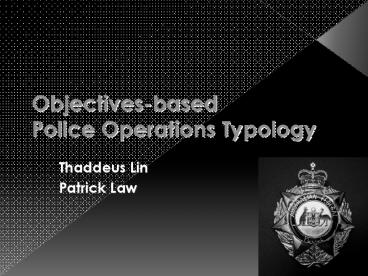Objectives-based Police Operations Typology - PowerPoint PPT Presentation
1 / 11
Title:
Objectives-based Police Operations Typology
Description:
Enables identification of critical differences between operations. ... experience, thereby achieving effectiveness in a wide rage of. activities. ... – PowerPoint PPT presentation
Number of Views:126
Avg rating:3.0/5.0
Title: Objectives-based Police Operations Typology
1
Objectives-based Police Operations Typology
- Thaddeus Lin
- Patrick Law
2
Why Categorise?
- Categorising according to important determinants
- Enables identification of critical differences
between operations. - Provide decision-makers with guidance in the
establishment of expectations. E.g. Tasks,
inputs, outputs and outcomes. - Enables valid comparison between operations.
(Comparing apples with apples.) - This typology aims to contribute to the
development of more effective performance
measurements.
3
Existing Typologies
4
Objectives-based Typology
- Traditional Monitoring
- Capacity Building
- Training and Mentoring
- Advising and Supporting
- Multidimensional Policing
- Executive Policing
5
Objectives-based Typology
- Traditional Monitoring - To monitor and observe
the implementation of police reform and/or
relevant aspects of a peace agreement. - Goals
- Supervising the performance, and ensuring
- the impartiality, of local police forces
- Verifying the integrity of critical processes
- such as disarmament or democratic elections
- Monitor belligerents compliance with peace
- / ceasefire agreements.
- Examples
- UNTAG (Namibia) UNFICYP (Cyprus)
- ONUSAL (El Salvador)
6
Objectives-based Typology
- Capacity Building To develop or modify
- the knowledge, skills and character traits of
police officers and - support staff through a planned and systematic
learning - experience, thereby achieving effectiveness in a
wide rage of - activities.
- Advising and Supporting
- Training and Mentoring
7
Objectives-based Typology
- Advising and Supporting - To provide advice and
- support to improve the professionalism and
increase the - capacity of local police service.
- Goals
- To provide technical assistance and strategic
support to increase the capacity and widen the
capabilities of the local police service. - To provide support for ongoing investigations
and/or provide threat/intelligence assessments. - Examples
- UNOMSIL (Sierra Leone) Australian Federal
- Police Cambodia AFP - Vanuatu Police
- Force Capacity Building Project
8
Objectives-based Typology
- Training and Mentoring - To directly provide
training - and mentoring to improve the professionalism and
increase the - capacity of local police service.
- Goals
- To reform behaviour of domestic police and
increase the skills - standards and specialists capacity of the
service through the - provision of training and mentoring.
- Examples
- MIPONUH (Haiti) MINURCA (Central African
Republic) - AFP UNMIS (SUDAN) AFP Jordan
9
Objectives-based Typology
- Multidimensional Policing Operations To assist
the host government in all policing functions
necessary to the restoration and maintenance of
the rule of law, public safety and order. - Goals
- To provide support to weak an ineffective
indigenous law - enforcement institutions in order to create and
maintain a - security environment conducive to the
implementation of - comprehensive restructuring and retraining
program. - Examples
- UNMIBH (Bosnia and Herzegovina) UNMIH (Haiti)
MONUC (DRC) - AFP - RAMSI
10
Objectives-based Typology
- Executive Policing Operations - To provide
interim law - enforcement services along the entire ambit of
activities, through the authority - conferred by the international administration,
while the development of a - professional local police service, generally from
scratch, is undertaken. - Goals Activities
- Full responsibility for the maintenance of law
and order. - (Re)build the entire local law enforcement
apparatus. - Fundamental difference from
- Multidimensional Policing
- Executive Policing Operations are authorised, and
- have their powers conferred, by an international
- administration, or body such as the U.N.
- Examples
11
CONCLUSION
- A more nuanced understanding of offshore policing
operations. - More accurate disaggregation of outputs and
outcomes. - Contribute to the development of a more precise
and sophisticated performance measurement
framework.































